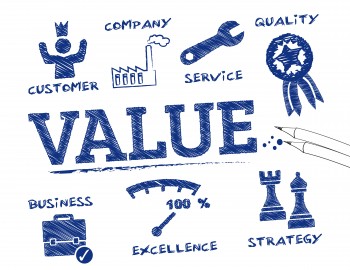Quantifying the value of project management
Two trains approach each other, one going 15 mph the other going 33 mph. If a rabbit jumps in front of the first train during a solar flare, how many tacos can Kenya buy with one human soul?
Yes, it’s fun to make fun of the so-called “new math,” and I know all of us drank out of the hose and never used a car seat and we’re all just fine, but the truth of the matter is that progress is sometimes just that– progress, even if we don’t understand its technicalities right off the bat.
So it is with calculating value in the business world.
For decades the mantra was always, ROI, ROI, ROI. The value of everything a business did could be calculated by taking the gain of an investment, subtracting the cost of the investment, and dividing the total by the cost of the investment. ROI = (Gains – Cost)/Cost.
But measured with this rigid yardstick, many valuable assets, including project management, cannot necessarily hold up, and today’s successful companies have come to realize this. Case in point: the janitor doesn’t bring in any money, but look how quickly productivity plummets when the bathrooms aren’t cleaned.
The “new math” in the business world takes a balanced scorecard approach. Rather than reducing everything down to a simple arithmetic problem, Fortune 1000 companies are looking at operational measures, such as project management, with a bigger scope. When these measures improve, financial health tends to follow, although not necessarily directly and not right away.
For you old curmudgeons reading this and shaking your heads with your slide rules in your pockets, here are some quantifiables to chew on:
Most projects fail
According to the Standish Group 2013 Chaos report, only 10% of large projects are successful. 38% outright fail and 52% are challenged. You can’t argue there isn’t room for improvement here.
Project management adds value
According to the Center for Business Practices Research Report 2001, 94% of respondents stated that implementing project management added value to their organizations, including, on average, improvements in financial performance (54%), project/process execution (50%), customer satisfaction (36%) and employee satisfaction (30%). Hmm, getting interested?
Operational measures like project management allow companies to strike hard in the areas that matter most
According to John P. Kotter and James L. Heskett’s critical analysis of company culture, Corporate Culture and Performance, companies that stressed shareholders, customers and employees increased revenues by an average of 682% (versus 166%), expanded their workforces by 282% (versus 36%), grew their stock prices by 901% (versus 74%) and increased their net incomes by 756% (versus 1%). Whoa! Sounds like implementing some of these project management thingamajiggies might be useful after all!
For project managers, however, it can still be a battle to try to prove your worth to the higher-ups. And, like many things in life (homeschooling, head lice removal, making a souffle), project management can be done well or it can be done poorly, with corresponding results.
The best way to prove your value as a project manager is to be the best project manager you can be and let the chips fall. Employing industry best practices in a right-sized manner that has the best fit for the culture of your organization, your team, and your projects. Ultimately, as project managers, our goal is to bring value to our team, our organization, and our clients by doing the right things the right way.
Don’t fear the new math. Embrace the new math. Industry leaders have never soared to the top by clinging to old thinking. Project management, implemented properly according to best practices and aligned with solid, correct, well-defined organizational objectives, is a key part of an equation that can help companies succeed exponentially.
Progress cannot be defined with a simple ROI equation. Like the value of a human soul, it is not only undefined, it is limitless.
About the author
Christy Swift has been a freelance writer and correspondent in the United States and Canada for over 10 years. With a degree in English and technical writing, she has a knack for making complicated subject matter digestible and even tasty. Christy regularly conducts research into the latest trends in project management to provide the Solarity Group with engaging content for its website and e-newsletters.
About Solarity >
We partner with organizations and individuals to help them go “from inspiration to implementation” by helping them to define the right work, plan the work, and work the plan.
